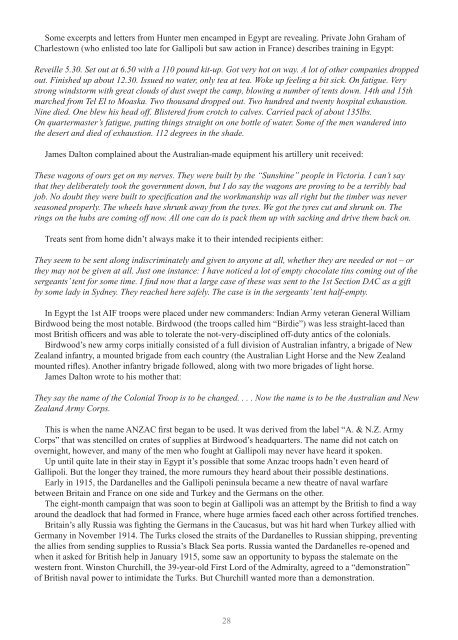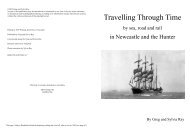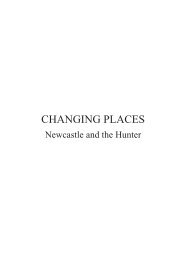Create successful ePaper yourself
Turn your PDF publications into a flip-book with our unique Google optimized e-Paper software.
Some excerpts and letters <strong>from</strong> <strong>Hunter</strong> men encamped <strong>in</strong> Egypt are reveal<strong>in</strong>g. Private John Graham of<br />
Charlestown (who enlisted too late for Gallipoli but saw action <strong>in</strong> France) describes tra<strong>in</strong><strong>in</strong>g <strong>in</strong> Egypt:<br />
Reveille 5.30. Set out at 6.50 with a 110 pound kit-up. Got very hot on way. A lot of o<strong>the</strong>r companies dropped<br />
out. F<strong>in</strong>ished up about 12.30. Issued no water, only tea at tea. Woke up feel<strong>in</strong>g a bit sick. On fatigue. Very<br />
strong w<strong>in</strong>dstorm with great clouds of dust swept <strong>the</strong> camp, blow<strong>in</strong>g a number of tents down. 14th and 15th<br />
marched <strong>from</strong> Tel El to Moaska. Two thousand dropped out. Two hundred and twenty hospital exhaustion.<br />
N<strong>in</strong>e died. One blew his head off. Blistered <strong>from</strong> crotch to calves. Carried pack of about 135lbs.<br />
On quartermaster’s fatigue, putt<strong>in</strong>g th<strong>in</strong>gs straight on one bottle of water. Some of <strong>the</strong> men wandered <strong>in</strong>to<br />
<strong>the</strong> desert and died of exhaustion. 112 degrees <strong>in</strong> <strong>the</strong> shade.<br />
James Dalton compla<strong>in</strong>ed about <strong>the</strong> Australian-made equipment his artillery unit received:<br />
These wagons of ours get on my nerves. They were built by <strong>the</strong> “Sunsh<strong>in</strong>e” people <strong>in</strong> Victoria. I can’t say<br />
that <strong>the</strong>y deliberately took <strong>the</strong> government down, but I do say <strong>the</strong> wagons are prov<strong>in</strong>g to be a terribly bad<br />
job. No doubt <strong>the</strong>y were built to specification and <strong>the</strong> workmanship was all right but <strong>the</strong> timber was never<br />
seasoned properly. The wheels have shrunk away <strong>from</strong> <strong>the</strong> tyres. We got <strong>the</strong> tyres cut and shrunk on. The<br />
r<strong>in</strong>gs on <strong>the</strong> hubs are com<strong>in</strong>g off now. All one can do is pack <strong>the</strong>m up with sack<strong>in</strong>g and drive <strong>the</strong>m back on.<br />
Treats sent <strong>from</strong> home didn’t always make it to <strong>the</strong>ir <strong>in</strong>tended recipients ei<strong>the</strong>r:<br />
They seem to be sent along <strong>in</strong>discrim<strong>in</strong>ately and given to anyone at all, whe<strong>the</strong>r <strong>the</strong>y are needed or not – or<br />
<strong>the</strong>y may not be given at all. Just one <strong>in</strong>stance: I have noticed a lot of empty chocolate t<strong>in</strong>s com<strong>in</strong>g out of <strong>the</strong><br />
sergeants’ tent for some time. I f<strong>in</strong>d now that a large case of <strong>the</strong>se was sent to <strong>the</strong> 1st Section DAC as a gift<br />
by some lady <strong>in</strong> Sydney. They reached here safely. The case is <strong>in</strong> <strong>the</strong> sergeants’ tent half-empty.<br />
In Egypt <strong>the</strong> 1st AIF troops were placed under new commanders: Indian Army veteran General William<br />
Birdwood be<strong>in</strong>g <strong>the</strong> most notable. Birdwood (<strong>the</strong> troops called him “Birdie”) was less straight-laced than<br />
most British officers and was able to tolerate <strong>the</strong> not-very-discipl<strong>in</strong>ed off-duty antics of <strong>the</strong> colonials.<br />
Birdwood’s new army corps <strong>in</strong>itially consisted of a full division of Australian <strong>in</strong>fantry, a brigade of New<br />
Zealand <strong>in</strong>fantry, a mounted brigade <strong>from</strong> each country (<strong>the</strong> Australian Light Horse and <strong>the</strong> New Zealand<br />
mounted rifles). Ano<strong>the</strong>r <strong>in</strong>fantry brigade followed, along with two more brigades of light horse.<br />
James Dalton wrote to his mo<strong>the</strong>r that:<br />
They say <strong>the</strong> name of <strong>the</strong> Colonial Troop is to be changed. . . . Now <strong>the</strong> name is to be <strong>the</strong> Australian and New<br />
Zealand Army Corps.<br />
This is when <strong>the</strong> name ANZAC first began to be used. It was derived <strong>from</strong> <strong>the</strong> label “A. & N.Z. Army<br />
Corps” that was stencilled on crates of supplies at Birdwood’s headquarters. The name did not catch on<br />
overnight, however, and many of <strong>the</strong> men who fought at Gallipoli may never have heard it spoken.<br />
Up until quite late <strong>in</strong> <strong>the</strong>ir stay <strong>in</strong> Egypt it’s possible that some Anzac troops hadn’t even heard of<br />
Gallipoli. But <strong>the</strong> longer <strong>the</strong>y tra<strong>in</strong>ed, <strong>the</strong> more rumours <strong>the</strong>y heard about <strong>the</strong>ir possible dest<strong>in</strong>ations.<br />
Early <strong>in</strong> 1915, <strong>the</strong> Dardanelles and <strong>the</strong> Gallipoli pen<strong>in</strong>sula became a new <strong>the</strong>atre of naval warfare<br />
between Brita<strong>in</strong> and France on one side and Turkey and <strong>the</strong> Germans on <strong>the</strong> o<strong>the</strong>r.<br />
The eight-month campaign that was soon to beg<strong>in</strong> at Gallipoli was an attempt by <strong>the</strong> British to f<strong>in</strong>d a way<br />
around <strong>the</strong> deadlock that had formed <strong>in</strong> France, where huge armies faced each o<strong>the</strong>r across fortified trenches.<br />
Brita<strong>in</strong>’s ally Russia was fight<strong>in</strong>g <strong>the</strong> Germans <strong>in</strong> <strong>the</strong> Caucasus, but was hit hard when Turkey allied with<br />
Germany <strong>in</strong> November 1914. The Turks closed <strong>the</strong> straits of <strong>the</strong> Dardanelles to Russian shipp<strong>in</strong>g, prevent<strong>in</strong>g<br />
<strong>the</strong> allies <strong>from</strong> send<strong>in</strong>g supplies to Russia’s Black Sea ports. Russia wanted <strong>the</strong> Dardanelles re-opened and<br />
when it asked for British help <strong>in</strong> January 1915, some saw an opportunity to bypass <strong>the</strong> stalemate on <strong>the</strong><br />
western front. W<strong>in</strong>ston Churchill, <strong>the</strong> 39-year-old First Lord of <strong>the</strong> Admiralty, agreed to a “demonstration”<br />
of British naval power to <strong>in</strong>timidate <strong>the</strong> Turks. But Churchill wanted more than a demonstration.<br />
28













